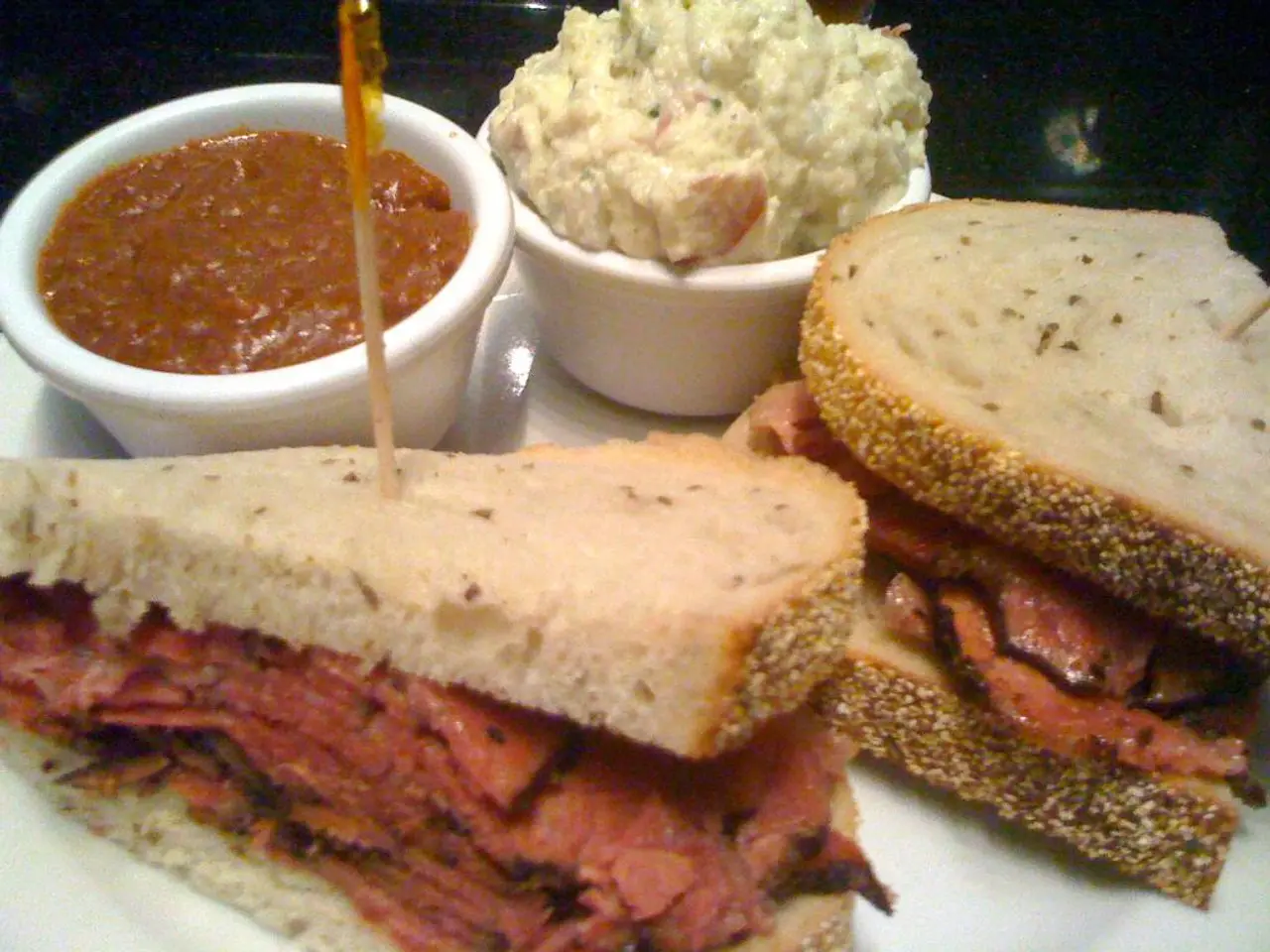Continuing Unabated: California's Medically-Tailored Meal Programs in Spite of Financial Reductions
California's Medi-Cal program is taking a significant step forward with the CalAIM (California Advancing and Innovative Medi-Cal) initiative. This initiative is moving away from a traditional, strictly medical services model and embracing a more holistic approach that integrates social services, such as food and nutrition, into healthcare[2][3].
The long-term strategy for CalAIM centres on partnerships between Medi-Cal managed care plans (MCPs) and social service organisations (SSOs). These partnerships aim to deliver "community supports" directly to eligible enrollees, including medically tailored meals for those with chronic or serious health conditions[3][5]. Unlike one-time pilot programs, CalAIM is structured as a multi-year (five-year) initiative, indicating a sustained commitment to these services[2][3].
CalAIM's approach has garnered strong bipartisan support. Despite budget fluctuations, California has recognised the importance of maintaining and expanding no-cost, medically tailored meal programs, viewing them as essential for improving health outcomes and reducing health disparities among vulnerable populations[1].
Services like medically tailored meals are targeted to high-need Medi-Cal enrollees, especially those with chronic medical conditions. These programs are designed to be a core benefit, not a temporary intervention, with funding and policies structured for continuity rather than short-term fixes[1][5].
Payment for these services is managed through direct contracts between MCPs and SSOs, with the aim of making food interventions a routine part of care for eligible patients[3][5]. This approach is intended to become a standard feature of managed care delivery under Medi-Cal.
Care under CalAIM is tailored to individual needs, with case managers (Enhanced Care Management) helping to coordinate food services as part of broader health and social support[2][3]. The initiative aims to reduce health disparities by prioritising services for the most at-risk groups, such as those experiencing homelessness or transitioning from institutions[2][3].
The strategy includes ongoing evaluation and adaptation, with SSO input to ensure partnerships remain effective and community-responsive[3]. A key feature of the strategy is its focus on equity, aiming to provide person-centered, equitable, and coordinated care to address the root causes of poor health[2][3].
Research has shown promising results from CalAIM-aligned programs. Across these programs, participants have lowered their A1c by an average of 1.1 points within 12 weeks[4]. This drop in A1c is associated with an average annual savings of $800 to $1,500 per diabetes patient[4]. Furthermore, a 2024 NIH study found a $13 return for every $1 spent on medically tailored meals[4].
Lane, Senior Vice President of Healthcare Partnerships at ModifyHealth, advocates for CalAIM, urging legislators not to retreat from successful models like CalAIM due to budget pressure, emphasising their role in keeping people out of the hospital and connected to care[4]. Lane also advocates for investment in models that prevent illness in vulnerable populations, citing the success of CalAIM in this regard[4].
In conclusion, the long-term strategy for no-cost meals in California’s Medi-Cal program, as advanced by CalAIM, is to institutionalise medically tailored meals and other nutrition supports as a standard, ongoing benefit for eligible, high-need enrollees—delivered through managed care and social service partnerships, backed by bipartisan political will, and structured for sustainability and adaptability[1][2][3].
| Strategy Element | Description | |-------------------------------|----------------------------------------------------------------------------------------------| | Integration | Food and nutrition as core, ongoing Medi-Cal benefits via MCP-SSO partnerships[3][5] | | Political Support | Bipartisan backing for no-cost meals as a health outcome driver, even amid budget pressures[1]| | Targeting | Services for high-need subgroups (e.g., chronic illness, homelessness)[2][5] | | Payment Model | Direct contracting between managed care plans and social service providers[3][5] | | Sustainability | Multi-year initiative with built-in flexibility and community input[2][3] |
References: [1] California Health Care Foundation. (2023). CalAIM: California’s Long-Term Strategy for No-Cost Meals. Retrieved from https://www.chcf.org/publications/2023/03/calaim-californias-long-term-strategy-for-no-cost-meals/ [2] California Department of Health Care Services. (2022). CalAIM: California Advancing and Innovating Medi-Cal. Retrieved from https://www.dhcs.ca.gov/services/medi-cal/calaim/Pages/default.aspx [3] ModifyHealth. (2023). CalAIM: A New Era for Medi-Cal. Retrieved from https://modifyhealth.com/calaim-a-new-era-for-medi-cal/ [4] Lane, J. (2023). CalAIM: A Game-Changer for Vulnerable Populations. Retrieved from https://www.modifyhealth.com/calaim-a-game-changer-for-vulnerable-populations/ [5] NIH. (2024). Study Finds $13 Return for Every $1 Spent on Medically Tailored Meals. Retrieved from https://www.nih.gov/news-events/news-releases/nih-study-finds-13-return-every-1-spent-medically-tailored-meals
- The city council discussed the community news about California's Medi-Cal program taking a significant step forward with the CalAIM initiative, focusing on a holistic approach that integrates social services, such as food and nutrition, into healthcare.
- The proposed long-term strategy for CalAIM centres on partnerships between Medi-Cal managed care plans (MCPs) and social service organisations (SSOs), delivering 'community supports' directly to eligible enrollees, including medically tailored meals for those with chronic or serious health conditions.
- Events like education seminars and fitness-and-exercise workshops are planned to be part of these 'community supports,' aimed at promoting health-and-wellness, nutrition, and chronic-diseases management.
- Personal-finance and budgeting workshops could also be included in these events, as ensuring financial stability is essential for managing chronic diseases and overall health.
- The entertainment industry could partner with CalAIM to offer wellness-focused programming, providing a means of education and awareness on topics like medical-conditions and their management in an engaging way.
- Research has shown promising results from CalAIM-aligned programs, with participants lowering their A1c levels and saving healthcare costs, demonstrating the potential impact of this approach on the community's health and the city's budget.
- The city council agreed to support CalAIM, recognizing its significance in addressing health disparities, improving health outcomes, and reducing healthcare costs for vulnerable populations in our city.




